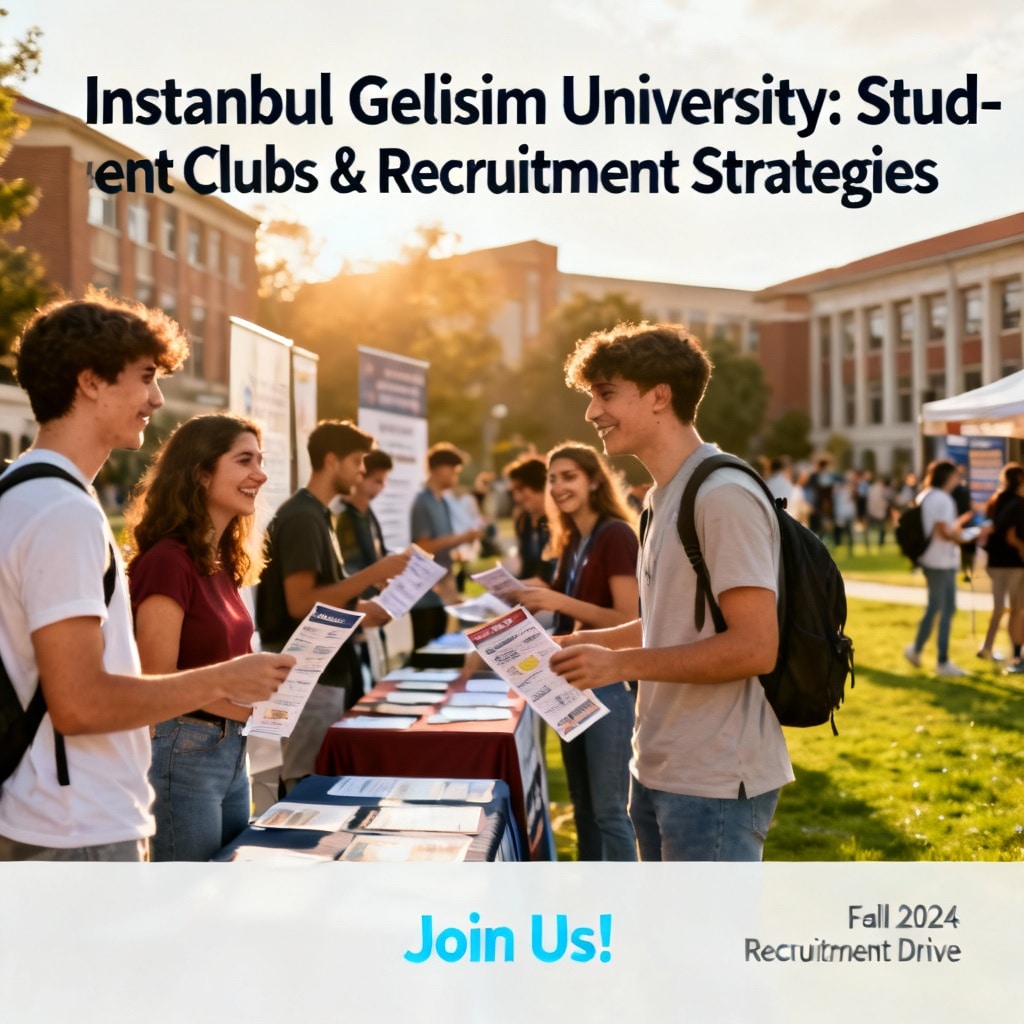Istanbul Gelişim University Student Clubs and Societies
Istanbul Gelişim University Student Clubs and Societies — An Overview
Istanbul Gelişim University (Gelisim University) supports a vibrant ecosystem of student clubs and societies focused on cultural, academic, entrepreneurial, artistic, and athletic development. While reported counts vary, the university typically hosts dozens of active organizations, each governed by student leadership with faculty advisory support.
Key characteristics:
- Diverse categories: academic and faculty clubs, arts and culture, community service, entrepreneurship and innovation, sports teams, and international student societies.
- Student-led governance: elected boards (president, vice president, treasurer, etc.), elected annually, with formal registration through the university’s student affairs office.
- Event-driven activity: workshops, competitions, conferences, cultural festivals, volunteering, and industry partnerships.
- Cross-campus collaboration: joint events with other universities and external organizations, supporting networking and employer engagement.
Why Clubs Matter to Institutional Stakeholders
Clubs and societies are not just extracurricular—they are strategic assets. For HR, marketing and admissions teams, clubs are:
- Talent pipelines: Clubs identify students with leadership, project management, and sector-specific skills.
- Brand amplifiers: Student events and competitions create organic marketing exposure for the university.
- Data sources: Participation trends help admissions identify high-interest programs and demographics.
- Engagement channels: Clubs support retention and student satisfaction metrics critical to university rankings and recruitment success.
Benefits for Students and for Employers
For Students:
- Leadership and soft skills development
- Practical, project-based experience
- Networking with peers, alumni, and employers
- Cross-cultural and language practice for international students
For Employers and Recruiters:
- Access to pre-vetted talent pools
- Opportunities for on-campus recruiting and internship partnerships
- Co-branded events and hackathons for employer branding
Structure and Governance: How Clubs Operate
Understanding the operational model makes it easier to partner effectively. Typical governance framework:
- Registration and recognition: Clubs register with Student Affairs and receive budgets, meeting spaces, and faculty mentors.
- Funding and sponsorship: University allocations supplemented by event sponsorships, ticket sales, and external grants.
- Reporting and compliance: Clubs submit activity reports and financial reconciliations each semester.
- Training and support: Leadership training, event planning workshops, and risk management guidance provided by the university.
Operational best practices for partnering organizations:
- Map club calendars at the start of each semester to schedule events and recruitment drives.
- Offer modular sponsorships (workshops, prizes, scholarships) to fit club budgets.
- Provide real-world briefs for student projects to deliver employer-relevant experience.
Club Categories, Sample Activities, and Impact Metrics
Academic and Department Clubs
- Focus: Discipline-specific activities—case competitions, guest lectures, research seminars, skill labs.
- Example Activities: Faculty roundtables and CV clinics, industry-led workshops in finance, engineering, health, and ICT.
Entrepreneurship and Innovation Societies
- Focus: Startup incubation, pitch competitions, mentorship networks.
- Example Activities: Startup weekends and accelerator bootcamps, collaboration with local ecosystems for seed funding.
Arts, Culture, and International Societies
- Focus: Cultural festivals, language exchange, music, theatre, and arts exhibitions.
- Example Activities: International Week and cultural showcases, student exchange promotion and orientation sessions.
Sports and Wellness Clubs
- Focus: Team sports, fitness classes, mental health workshops.
- Example Activities: Inter-university tournaments and wellness days, coaching and physical education certifications.
Community Service and Social Responsibility
- Focus: Volunteering, public health drives, environmental campaigns.
- Example Activities: Local community outreach and NGO partnerships, sustainability projects on campus.
How International Recruiters and Admissions Teams Can Engage Effectively
Clubs are an efficient route to find qualified international students and build long-term relationships. Below are actionable tactics tailored for recruiters, agents, and admissions professionals.
Tactical Engagement Model
- Identify relevant clubs: Map which clubs align with your target disciplines and demographics.
- Offer high-value engagements: Provide workshops, mentorship sessions, or scholarships.
- Integrate recruitment with student development: Sponsor competitions with guaranteed internship placements or fast-track applications.
- Use club leaders as ambassadors: Form a student ambassador program that supports recruitment and orientation.
Case Examples & Collaboration Opportunities with Top Turkiye Institutions
When building partnerships or expanding recruitment operations in Turkiye, it helps to benchmark against activity at other leading universities. Below are examples of universities with active student engagement models:
- Gelisim University — explore student life and club opportunities.
- Medipol University — strong programs in health sciences and active medical student societies.
- Uskudar University — known for behavioral sciences and psychology student organizations.
- Ozyegin University — entrepreneurship and technology societies often collaborating with startups.
- Bahcesehir University — active international student unions supporting cross-cultural programs.
- Beykent University — robust sports and social clubs.
- Halic University — active student media and communication clubs.
- Antalya Bilim University — a regional hub for health collaborations.
- Aydin University — engineering collaborations.
Measuring Impact — KPIs and Evaluation Frameworks
To justify investments and refine strategies, use measurable KPIs.
Suggested KPIs:
- Event participation rate (by nationality and program interest)
- Lead-to-application conversion rate from club events
- Internship-to-employment conversion for students engaged via partnerships
- Retention and satisfaction scores among scholarship recipients
- Social reach and media mentions generated by sponsored activities
Evaluation cadence:
- Monthly reporting during active recruitment windows
- Post-semester outcomes review aligning with admissions cycles
- Annual strategic review with partner universities and Study in Turkiye
Take the Next Step with Study in Turkiye
Discover how to leverage the opportunities presented by student clubs and societies at Istanbul Gelişim University. Engage with us to explore strategic partnerships and recruitment solutions.

